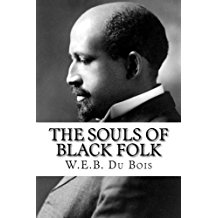The Souls of Black Folk, W.E.B. DuBois, 1903
Fitting that I should finish this book for English 166 on Election Day, when our first African-American President begins his final months in office. It’s also an interesting addition to my education about being Black in America that began with the Civil War preparatory reading in the spring and extended through Baldwin and Coates this summer. All in all, it’s been eye-opening and depressing to see how 250 years of slavery in this nation continues to soil our national discourse and civility. As DuBois states more than 100 years ago with reference to the last Century, “The Problem of the Twentieth Century is the problem of the color-line.” Much progress but much left to be done. DuBois introduces several important concepts including the Veil, the double consciousness of the Black American, and the concept of the talented tenth. He, himself, is a fascinating character—born and educated in Great Barrington, Massachusetts, a graduate of Fisk and Harvard’s first Black PhD, founder of the NAACP, an opponent of the great Booker T. Washington, and a pan-Africanist, he was born within three years of the end of the Civil War and died five years before the passage of the Civil Rights and Voting Rights Laws in the 1960’s. The book itself veers from the history of Reconstruction to a personal chapter on losing a son to a fictional account of two Johns who went away, to a final chapter on the Negro spiritual. Through it all runs DuBois’ anger with the white race for continuing to deny Blacks their due as humans with souls. An important book.



